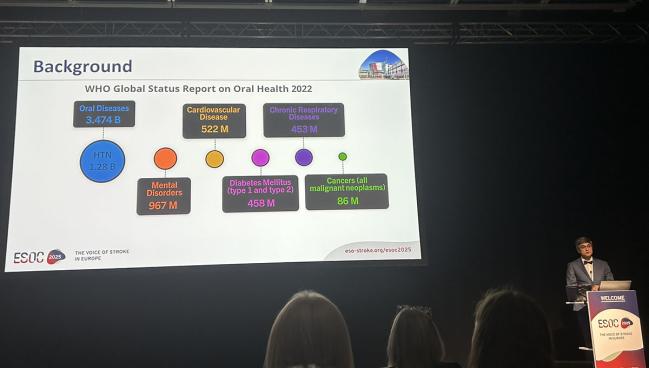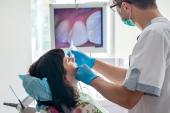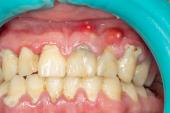Don’t Forget to Floss! Better Oral Hygiene May Help Stave Off Stroke
Oral hygiene is often neglected when it comes to stroke, but it’s low-hanging fruit than can aid in primary prevention.

HELSINKI, Finland—People who report taking better care of their teeth, particularly with flossing, appear to have a lower risk of stroke over the long term, according to an analysis of the Atherosclerosis Risk in Communities (ARIC) study.
Those who reported flossing at baseline had a significantly lower risk of incident stroke 25 years later compared with those who didn’t floss, even after accounting for various potential confounders, Souvik Sen, MD (University of South Carolina, Columbia), reported here at the European Stroke Organisation Conference (ESOC) 2025.
The relationship seemed to be mediated by reductions in inflammatory biomarkers. Other types of oral care, including brushing and having regular dental visits, also reduced inflammation, but they were not associated with long-term stroke risk.
“It is an important public health message,” Sen said during his presentation, that oral healthcare might lower stroke risk through an anti-inflammatory mechanism.
Indeed, commented Jelle Demeestere, MD, PhD (University Hospitals Leuven, Belgium), chair of the ESO public relations subcommittee, “targeting inflammation has become a big topic within stroke, because we’ve realized in the last decade or 15 years that inflammation is an important driver behind some of the underlying pathophysiology of stroke—for instance, atherosclerotic disease but also atrial fibrillation—and might be an important mediator for recurrence.
“So, if we could prevent inflammation,” he continued, “we might have an important tool to prevent stroke recurrence or stroke occurrence.”
Prior cross-sectional studies have shown associations between oral care and risk of cardiovascular disease, with inflammation as a presumed mechanism, but there are limited data specifically around stroke.
To help fill that gap, Sen and his colleagues examined data from the fourth visit of the ARIC study, which took place between 1996 and 1998. At that point, participants completed a questionnaire on oral care habits and underwent a dental assessment and testing for inflammatory markers. Follow-up information came from the ninth visit of the study, in 2021.
The analysis zeroed in on 6,278 people who both underwent the planned dental assessment and were free from prior stroke or coronary heart disease at baseline.
After adjustment for age, race, sex, hypertension, diabetes, hyperlipidemia, smoking status, education level, and other types of oral care, flossing was associated with lower risk of incident stroke during follow-up (adjusted HR 0.80; 95% CI 0.65-0.99), with no significant relationships for either brushing regularly (adjusted HR 1.06; 95% CI 0.85-1.32) or having a regular dental visit (adjusted HR 0.85; 95% CI 0.66-1.10).
All three practices were associated with lower odds of periodontal disease (ORs 0.17-0.48) and dental caries (ORs 0.10-0.52), as well as lower levels of the pro-inflammatory marker interleukin-6. They did not, however, influence concentrations of interleukin-1β. Only regular dental visits were associated with lower levels of high-sensitivity C-reactive protein.
The impact of flossing on incident stroke risk was enhanced by a greater frequency of flossing. A mediation analysis indicated that flossing reduces periodontal disease/dental caries, which in turn leads to a reduction in inflammatory markers and, ultimately, lower odds of stroke.
Demeestere said that no conclusions about causality can be drawn from the study. Participants completed questionnaires on dental care once at baseline and there’s no way to know whether habits changed during follow-up, he noted.
Nonetheless, the findings are in line with prior observational data and support actionable messages for clinicians, Demeestere said.
“Oral hygiene is something that is not well addressed within stroke clinics,” he said. “When we talk to patients about prevention of stroke—either primary prevention or secondary prevention—we almost never talk about oral hygiene, whereas we have more and more evidence that this is an important risk factor that we should address.”
Moreover, oral hygiene is a relevant, and often neglected, issue for patients who are hospitalized for stroke because it can affect outcomes. “This may be mediated partially because of inflammation, but also partially because of an increased risk of having infectious complications like pneumonia during the hospitalization,” Demeestere said.
He stressed the need for people to both maintain good oral care habits at home and schedule regular visits with a dentist.
Todd Neale is the Associate News Editor for TCTMD and a Senior Medical Journalist. He got his start in journalism at …
Read Full BioSources
Sen S. Oral preventive strategies, periodontal disease, caries, inflammation, and stroke prevention: the ARIC study. Presented at: ESOC 2025. May 21, 2025. Helsinki, Finland.
Disclosures
- Demeestere and Sen report no relevant conflicts of interest.





Comments